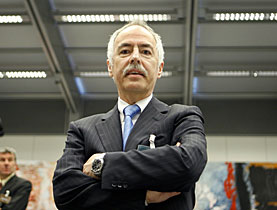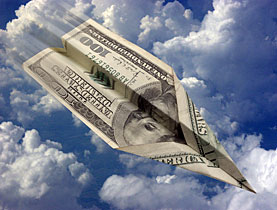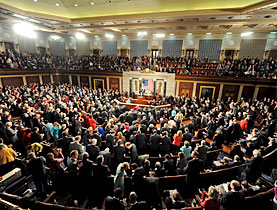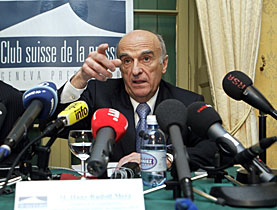“We do not want to protect tax criminals”

Urs P. Roth, the chief executive officer of the Swiss Bankers Association, attributes much of the pressure from the United States on tax havens to domestic politics.
In an interview with swissinfo.ch, Roth said he hopes the US and Switzerland will agree to a revised double-taxation treaty that reflects the standards of the Organisation for Economic Co-operation and Development (OECD) model tax convention.
Bankers in Switzerland say that secrecy is not the industry’s only selling point. But as the government renegotiates double-taxation treaties with dozens of jurisdictions, Swiss banking is poised to experience sweeping changes.
In the US, Swiss banks have been the subject of lurid allegations and negative press, but Roth believes that, in general, they are viewed positively among both policymakers and the public. He vigorously defends the integrity of the industry.
In a case dating to 2007, UBS, Switzerland’s largest bank, could be forced by a Florida court to give up the secret identities of thousands of accountholders. Roth believes the case should be resolved through diplomatic channels but said it is “clear that governments need to focus more on tax enforcement”.
swissinfo.ch: Some experts say the US is correct in pursuing UBS into Switzerland. The New York Times editorial board agrees. What do you think?
Urs P. Roth: UBS is in a situation where if the John Doe summons were to be enforced, it would have to choose between two bad options: to violate US law or to violate Swiss law. That is an untenable position. Clearly those people that violated the law in the US should be held responsible but we are in a situation that should not be resolved by a court.
These types of cases are regularly resolved by diplomatic means and that’s also the case for the US in many instances.
swissinfo.ch: The people who should be held to account – are you referring to the Swiss bankers or to the US tax evaders?
U.R.: To both. I do not agree with tax evasion, to be absolutely clear. We do not want to protect tax criminals or any other criminals. But international cases must be resolved diplomatically and not by applying extraterritorial powers.
swissinfo.ch: Libertarians in the US support banking secrecy. How do you get more of this support?
U.R.: We do two things: We monitor developments in the US that are of interest for Swiss banks and for the international financial sector. We also provide information on Switzerland, Swiss banking and the way we do business.
We talk to members of Congress, their staffers, the administration, think tanks, the media and other banks. We are not actually trying to influence, in the context of searching for allies. It’s more an information campaign that we have been conducting for the past 20 years or so.
swissinfo.ch: In Florida, the Swiss are arguing judicial sovereignty. That will not resonate with the American electorate. How do you argue that banking secrecy is good for the US?
U.R.: We don’t just argue sovereignty. That is more the case for the Swiss government. What we’re saying on the one hand is that this is not how international disputes should be resolved – would the US appreciate it if a foreign country were to unilaterally and extraterritorially enforced a John Doe summons against a US institution?
On the other hand, we try to say that Switzerland has been a very important economic and political partner for the US. Swiss firms employ some 300,000 people in the US. In the financial sector, there are 45,000 working for Swiss institutions. We are the seventh-largest direct investor with some $160 billion (SFr174 billion) worth of assets and investments.
swissinfo.ch: In the case of UBS, substitute Switzerland for a larger and more powerful country – China, for example. Experts say the US government probably would not have adopted the same strategy.
U.R.: I would hope the US government would treat Switzerland the same as China. I’m convinced that the US government appreciates that Switzerland has been a long-time ally, that both countries share democracy, the right to freedom and liberal rights. Switzerland has protected the interests of the US in Iran, in Cuba and in other places.
At this point, this has not been a political case in the US. This should not be considered solely as a US domestic issue but as an international situation, where the interests of both countries need to be balanced against each other and where disputes should be resolved by diplomatic means and according to bilateral agreements rather than solely by using extraterritorial powers.
swissinfo.ch: Some say the US is not looking at the root cause of evasion – high taxes. That’s very similar to what you say, which is that tax evasion reflects a broken relationship between citizens and the state. Are you surprised?
U.R.: That did not surprise me too much. Tax evasion is a fact. One of the symptoms may certainly be in high tax jurisdictions that there is a broken relationship between the state and the taxpayer. Beyond that, it may not in all instances be a symptom of a broken relationship. It may be that people simply do not want to pay what they owe.
swissinfo.ch: The Tax Justice Network says there is no absolute privacy in banking. How closely is privacy linked to the future of the Swiss industry?
U.R.: Privacy will continue to be a very important aspect of doing business. That’s a very universal concept, not just a Swiss concept. But clearly, privacy can never be unlimited and it can never protect criminals including tax cheats. This is what Switzerland has accepted.
Switzerland has been at the forefront of establishing rules to make sure that criminals cannot misuse financial centres. We have implemented rules to deal with any potential plundering dictators and we have had a long established tradition of exchanging information in criminal cases including tax fraud.
The other question is: should there be an automatic exchange of information? This is something some advocates really want but is not the way the US wants to go forward. I believe this is something that the global community would not accept.
Justin Häne in Zurich, swissinfo.ch
This is the fourth in a four-part reportage examining tax haven news and views from the United States, and the Swiss reaction. Swiss officials were negotiating a new double taxation agreement with the US this week.
Switzerland has been under fire from US lawmakers for a number of years over banking secrecy. Critics say it allows people to store illicit assets and avoid paying taxes.
On May 14, 2008, the problem got worse when a UBS banker and a Liechtenstein businessman were charged with helping a US billionaire evade taxes.
In July 2008, a Miami court said the Internal Revenue Service could issue a John Doe summons, which would demand the names of around 52,000 UBS accountholders without proof that they were all tax evaders.
Swiss banks are not allowed to reveal the names of people who only fail to disclose assets or income to the US authorities. The Swiss government said the order would violate the country’s sovereignty as well as an existing Swiss-US income tax treaty.
Citing updates to a treaty dating to 1951, Switzerland says it cooperates in cases of “tax fraud and the like”.
The Internal Revenue Service says the treaty should be “viewed in context”.
UBS has in the mean time quit private banking in the US and will hand over a few hundred client names.
In March, the Swiss decided to ease banking secrecy. They are renegotiating double taxation agreements with a number of countries, including the US, but have already said they will drop the distinction between evasion and fraud.
Swiss officials met on June 16 with US officials for a second time.

In compliance with the JTI standards
More: SWI swissinfo.ch certified by the Journalism Trust Initiative




You can find an overview of ongoing debates with our journalists here. Please join us!
If you want to start a conversation about a topic raised in this article or want to report factual errors, email us at english@swissinfo.ch.